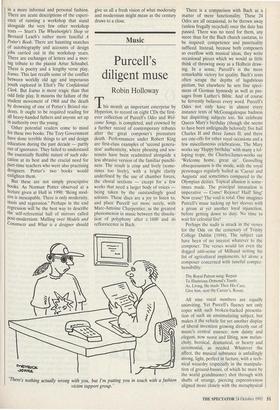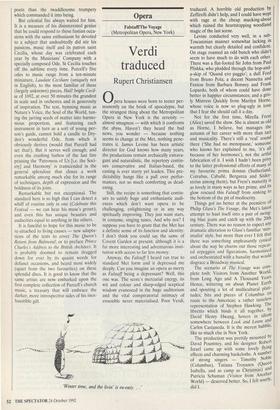Music
Purcell's diligent muse
Robin Holloway
his month an important enterprise by
T
Hyperion, to record on eight CDs the first- ever collection of Purcell's Odes and Wel- come Songs, is completed, and crowned by a further record of contemporary tributes after the great composer's premature death. Performances under Robert King are first-class examples of 'second genera- tion' authenticity, where phrasing and sos- tenuto have been readmitted alongside a less abrasive version of the familiar punchi- ness. The result is crisp and lively (some- times too lively), with a bright clarity underlined by the use of chamber forces, the choral sections — except for a few works that need a larger body of voices — being taken by the outstandingly good soloists. These discs are a joy to listen to, and place Purcell yet more surely, with Marc-Antoine Charpentier, as the greatest phenomenon in music between the dissolu- tion of polyphony after c. 1600 and its reflorescence in Bach.
'There's nothing actually wrong with you, but I'm putting you in touch with a fashion victim support group.' There is a comparison with Bach as a matter of mere functionality. These 24 Odes are all occasional, to be thrown away (unless frugally recycled) once the date has passed. There was no need for them, any more than for the Bach church cantatas, to be inspired: competence and punctuality sufficed. Instead, because both composers so overflow with musical ideas, they write occasional pieces which we would as little think of throwing away as a Holbein draw- ing. In a sense, Purcell's is the more remarkable victory for quality. Bach's texts often scrape the depths of lugubrious pietism, but elsewhere he sets fine speci- mens of German hymnody as well as pas- sages from Luther's Bible. And of course he fervently believes every word. Purcell's Odes not only have in almost every instance texts of McGonagalesque badness but dispiriting subjects too. Six celebrate Queen Mary's birthday (though she seems to have been unfeignedly beloved); five hail Charles II and three James II; and there are one-offs for other royal occasions and a few miscellaneous celebrations. The Mary works say 'Happy birthday' with many a lol- loping trope, the Charles/James-works say 'Welcome home, great sir'. Grovelling obsequiousness is the mode, with the royal personages regularly hailed as 'Caesar and Augusta' and sometimes compared to the Olympian deities. Topical allusion is some- times made. The principal intonation is imperative — Come! Rejoice! Hail! Sing! Now cease! The void is total. One imagines Purcell's muse tucking up her sleeves with a groan at yet another loyal injunction, before getting down to duty. No time to wait for celestial fire!
Perhaps the nadir is struck in the verses for the Ode on the centenary of Trinity College Dublin (1694). The subject can have been of no interest whatever to the composer. The verses would tax even the dogged anti-sense of Milhaud setting his list of agricultural implements, let alone a composer concerned with tuneful compre- hensibility:
Thy Royal Patron sung: Repair To Illustrious Ormond's Tomb: As, Living, He made Thee His Care, Give him, next thy Caesar's, Room.
All nine vocal numbers are equally uninviting. Yet Purcell's fluency not only copes with such broken-backed presenta- tion of such an unstimulating subject, but makes it the vehicle for yet another display of liberal invention growing directly out of music's central essence: now dainty and elegant, now suave and lilting, now melan- choly, heroical, dramatical, or hearty and ceremonial, as needed. Whatever the affect, the musical substance is unfailingly strong, light, perfect in facture, with a tech- nical wizardry (especially in the manipula- tion of ground-basses, of which he must be the world grandmaster) shot through with shafts of strange, piercing expressiveness aligned more closely with the metaphysical poets than the twaddlesome trumpery which commanded it into being.
But celestial fire always waited for him. It is a measure of his disinterested genius that he could respond to these fustian occa- sions with the same enthusiasm he devoted to a subject that undoubtedly did stir his passions, music itself and its patron saint Cecilia, whose day was celebrated each year by the Musicians' Company with a specially composed Ode. St Cecilia touches off the sublime every time. Purcell's five odes to music range from a ten-minute miniature, Laudate Ceciliam (uniquely not in English), to the most familiar of these (largely unknown) pieces, Hail! bright Cecil- ia of 1692, at over 50 minutes the grandest in scale and in orchestra and in generosity of inspiration. The text, hymning music as Nature's Voice, the Soul of the World, tun- ing the jarring seeds of matter into harmo- nious proportion, and featuring each instrument in turn as a sort of young per- son's guide, cannot hold a candle to Dry- den's wonderful Ode, from which it obviously derives (would that Purcell had set that!). But it serves well enough; and even the crashing bathos of the last line praising the 'Patroness of Us [i.e. the Soci- ety] and Harmony' is transcended in the general splendour that closes a work remarkable among much else for its range of techniques, depth of expression and the boldness of its joins.
Remarkable but not exceptional. The standard here is so high that I can detect a whiff of routine only in one (Celebrate this Festival — we can hear his muse's groan); and even this has unique beauties and audacities equal to anything in the others.
It is fanciful to hope for this music to be re-attached to living causes — new adapta- tions of the texts to cover The Queen's Return from Balmoral; or to preface Prince Charles's Address to the British Architect. It is probably doomed to remain dragged down for ever by its quaint words for defunct occasions, and heard most widely (apart from the two favourites) on these splendid discs. It is good to know that the same artists are now embarked upon the first complete collection of Purcell's church music, a treasury that will embrace the darker, more introspective sides of his inex- haustible gift.



































































 Previous page
Previous page